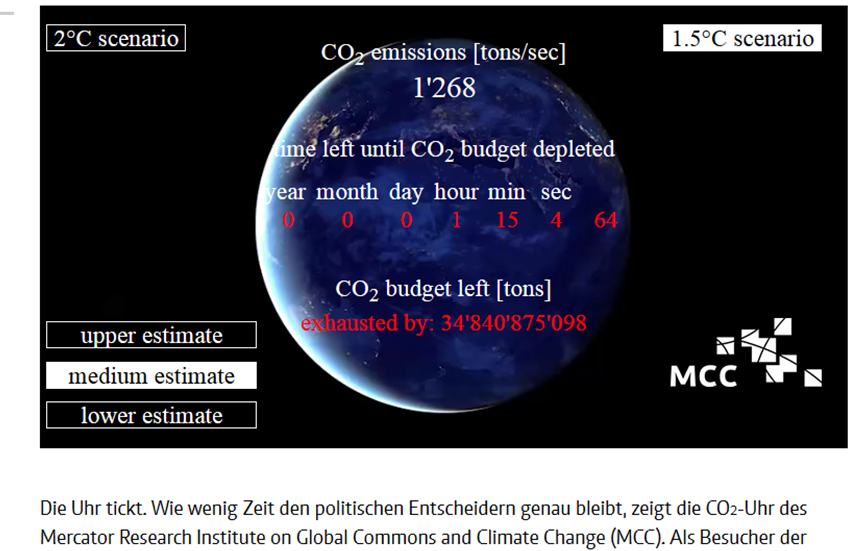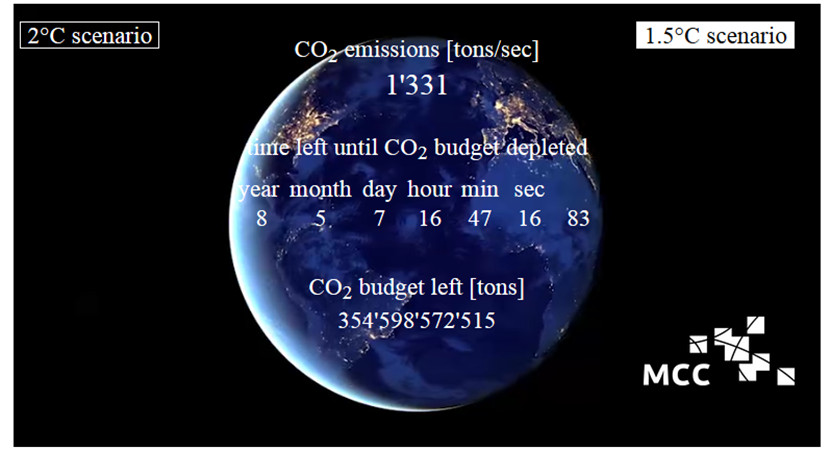Wer hat an der Uhr gedreht, ist es wirklich schon so spät?
An diesen Ohrwurm der frühen Fernsehgeschichte wird man bei der Betrachtung der CO2-Uhr erinnert. Die Uhr zeigt das verbleibende CO2-Budget an, das bis zur Überschreitung der 2,0°C bzw. 1,5°C-Klimaziele angeblich noch verbleibt. Die CO2-Uhr wird von der Stiftung Mercator betrieben, welche die Dekarbonisierung Deutschlands zum Ziel hat. Ähnlich wie bei den einschlägigen Weltuntergangssekten ergab sich im Mai 2018 für die Stiftung Mercator allerdings ein ernsthaftes Problem: Die CO2-Uhr für das 1,5°C-Ziel war abgelaufen. Und die Welt existierte einfach weiter, ohne unterzugehen. Ziemlich peinlich. Hier ein Screenshot der CO2-Uhr vom 28. Mai 2018, via Wayback Machine:
Abbildung 1: CO2-Uhr der Stiftung Mercator für das 1,5-Gradziel, vom 28. Mai 2018, via Wayback Machine.
Auweia. Die Stiftung griff zum üblichen Mittel: Der (klimatische) Weltuntergang wurde einfach in die Zukunft verschoben, um die Angstkulisse weiter aufrecht zu erhalten. Wenn man die Uhr heute anklickt, sind wieder achteinhalb Jahre Zeit bis zum angenommenen Klimakollaps:
Abbildung 2: CO2-Uhr der Stiftung Stiftung Mercator für das 1,5-Gradziel, vom 23. Juli 2019. Quelle: Stiftung Mercator.
Eine Forschergruppe um Shinichiro Asayama unter Beteiligung von Oliver Geden von der Berliner Stiftung Wissenschaft und Politik (SWP) warnten nun eindrücklich vor dem Missbrauch einer Endzeit-Rhetorik. Der IPCC müsse hier endlich Verantwortung übernehmen und die falsche Interpretation der CO2-Budgets durch Aktivisten anprangern. In einem Kommentar in Nature Climate Change vom 22. Juli 2019 schreiben die Wissenschaftler:
Why setting a climate deadline is dangerous
The publication of the IPCC Special Report on global warming of 1.5 oC paved the way for the rise of the political rhetoric of setting a fixed deadline for decisive actions on climate change. However, the dangers of such deadline rhetoric suggest the need for the IPCC to take responsibility for its report and openly challenge the credibility of such a deadline.In October 2018, the IPCC released its Special Report on global warming of 1.5 °C (SR15), which concluded that global temperature is likely to reach 1.5 °C above pre-industrial levels between 2030 and 2052 if the current rate of warming continues. Sensational news headlines interpreting this as a 12-year deadline for the world to avoid catastrophic climate change sparked widespread calls for urgent radical actions. […] This rise of ‘climate deadline-ism’ is, in some ways, a product of long-standing scientific (and political) endeavours to quantify what is ‘dangerous’ climate change. […] Insomuch as the rhetoric of a 2030 deadline arises from political (mis)use of science in setting an artificial deadline, this poses a crucial question to scientists, and specifically to the scientists in the IPCC. What is a responsible response to the politics of deadline-ism for the IPCC as the authoritative voice of climate science? […] However, setting a near-term deadline to urge immediate policy actions could do the opposite of what is intended.
[…] A more fundamental problem with deadline-ism is that it might incite cynical, cry-wolf responses and undermine the credibility of climate science when an anticipated disaster does not happen. The imagery of deadlines and countdown clocks offers an illusory cliff-edge after which the world heads inevitably to its imminent demise. It promulgates the imaginary of extinction and the collapse of civilization. The impacts of climate change are more likely to be intermittent, slow and gradual. […] The risks of unfolding climate change need to be taken seriously, but it would be a mistake to take the claims of a climate deadline literally. […] Deadline-ism is at once both ineffectual and self-defeating. […] Despite good intentions, the rhetoric of a 2030 deadline is the political (mis)use of science for setting an artificial deadline. Although the rhetoric is usually seen by scientists as a misleading interpretation of the IPCC findings, the IPCC and most climate scientists have so far kept silent, thereby implicitly seeming to endorse it.
Ganzen Artikel in Nature Climate Change lesen.
Passend zum Thema: Lesen Sie auch diesen SRF-Beitrag:
Gesellschaft & Religion – Der Weltuntergang ist ein uralter Albtraum
Die Menschen fürchten sich seit mindestens 2000 Jahren vor dem Weltuntergang. Bisher ist er ausgeblieben. Die Menschheit darf sich jedoch noch nicht in Sicherheit wiegen. Der Historiker Johannes Fried widmet sein neues Buch «Dies Irae» dem Thema und den damit verbundenen Ängsten.
Weiterlesen beim SRF

